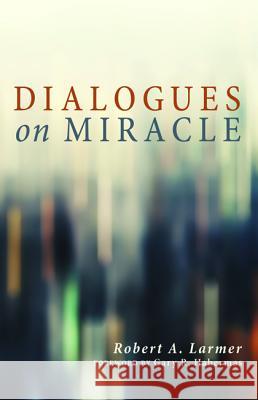Dialogues on Miracle » książka
Dialogues on Miracle
ISBN-13: 9781625648167 / Angielski / Miękka / 2015 / 154 str.
This book explores, in a manner that is readily accessible to those with little or no formal training in philosophy or theology, important questions concerning the rationality of belief in miracles. This book employs the time-honored literary device of dialogue, a practice that dates as far back as Plato. Done well, this form of philosophical investigation puts forward a thesis, yet genuinely engages with the views its author opposes. These dialogues are intended to provide a philosophical defense of the possibility of rationally justified belief in miracles. Such a defense can legitimately dispense with much of the paraphernalia that professional scholars in a discipline use in writing for other professional scholars in their discipline--some scholarly texts seem to be more references than argument--but it must not ""dumb down"" the material by oversimplifying the issues, or presenting ""straw man"" versions of the arguments it seeks to refute. My hope is that not only those who are already convinced of the rationality of belief in miracles will read this book, but also those who are unconvinced. ""For several decades, Robert Larmer has labored over the various topics related to miracles. And with Dialogues on Miracles, we are treated to the mature fruit of his labor. This book is simply excellent. It updates coverage of traditional topics (the definition of a miracle), but it adds topics seldom related to miracles (miracles and the problem of evil). And besides being treated to a feast of ideas regarding miracles, Larmer writes the book in a dialogue style, making the ideas very accessible. . . . I highly recommend Dialogues on Miracles."" --JP Moreland, Distinguished Professor of Philosophy, Biola University ""Robert Larmer writes with consummate skill on the controversial and elusive concept of miracle. This engaging book, which makes effective use of dialogue, continues his previous studies of the topic, which now spans more than twenty-five years. It exhibits the insight that can be gained by viewing some matter from every conceivable angle. What is more, he thinks that (real) miracle occurs. Few philosophers even think that is possible, and even fewer would say so."" --Phillip H. Wiebe, Professor of Philosophy, Trinity Western University ""Larmer's philosophical work manifests two rare qualities. First, crystal clarity: he expresses difficult concepts in a way that almost everyone can understand, avoiding needless, pedantic jargon. Second, genuine fairness: he presents alternative viewpoints in their best possible light, never setting up 'straw men' to knock down. Both of these admirable qualities are on full display in this present volume. . . . The result is a book that is likely to become the standard introduction to the subject of miracles for many years to come."" --Robert Stackpole, Director of the John Paul II Institute of Divine Mercy Robert Larmer is Professor and Chair of the Philosophy Department at the University of New Brunswick. He has authored several previous books on the concept of miracle, the most recent being The Legitimacy of Miracle (2014).
This book explores, in a manner that is readily accessible to those with little or no formal training in philosophy or theology, important questions concerning the rationality of belief in miracles. This book employs the time-honored literary device of dialogue, a practice that dates as far back as Plato. Done well, this form of philosophical investigation puts forward a thesis, yet genuinely engages with the views its author opposes.These dialogues are intended to provide a philosophical defense of the possibility of rationally justified belief in miracles. Such a defense can legitimately dispense with much of the paraphernalia that professional scholars in a discipline use in writing for other professional scholars in their discipline--some scholarly texts seem to be more references than argument--but it must not ""dumb down"" the material by oversimplifying the issues, or presenting ""straw man"" versions of the arguments it seeks to refute. My hope is that not only those who are already convinced of the rationality of belief in miracles will read this book, but also those who are unconvinced.""For several decades, Robert Larmer has labored over the various topics related to miracles. And with Dialogues on Miracles, we are treated to the mature fruit of his labor. This book is simply excellent. It updates coverage of traditional topics (the definition of a miracle), but it adds topics seldom related to miracles (miracles and the problem of evil). And besides being treated to a feast of ideas regarding miracles, Larmer writes the book in a dialogue style, making the ideas very accessible. . . . I highly recommend Dialogues on Miracles.""--JP Moreland, Distinguished Professor of Philosophy, Biola University""Robert Larmer writes with consummate skill on the controversial and elusive concept of miracle. This engaging book, which makes effective use of dialogue, continues his previous studies of the topic, which now spans more than twenty-five years. It exhibits the insight that can be gained by viewing some matter from every conceivable angle. What is more, he thinks that (real) miracle occurs. Few philosophers even think that is possible, and even fewer would say so.""--Phillip H. Wiebe, Professor of Philosophy, Trinity Western University""Larmers philosophical work manifests two rare qualities. First, crystal clarity: he expresses difficult concepts in a way that almost everyone can understand, avoiding needless, pedantic jargon. Second, genuine fairness: he presents alternative viewpoints in their best possible light, never setting up straw men to knock down. Both of these admirable qualities are on full display in this present volume. . . . The result is a book that is likely to become the standard introduction to the subject of miracles for many years to come.""--Robert Stackpole, Director of the John Paul II Institute of Divine MercyRobert Larmer is Professor and Chair of the Philosophy Department at the University of New Brunswick. He has authored several previous books on the concept of miracle, the most recent being The Legitimacy of Miracle (2014).











